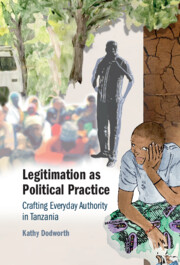Book contents
- Legitimation as Political Practice
- Legitimation as Political Practice
- Copyright page
- Dedication
- Contents
- Figures
- Tables
- Foreword
- Preface and Acknowledgements
- Abbreviations
- Introduction
- 1 Legitimacy and Legitimation
- 2 Practicing Legitimation
- 3 ‘We Go Deeper’
- 4 ‘In and Out’
- 5 ‘I Was Chosen; It’s the Work That’s Voluntary’
- 6 ‘These People, They Just Sit!’
- 7 ‘Reporting Has All Sorts of Issues!’
- Conclusion
- Appendix A: Interviews
- Glossary
- References
- Index
3 - ‘We Go Deeper’
Extensity and Territoriality as Practice
Published online by Cambridge University Press: 05 May 2022
- Legitimation as Political Practice
- Legitimation as Political Practice
- Copyright page
- Dedication
- Contents
- Figures
- Tables
- Foreword
- Preface and Acknowledgements
- Abbreviations
- Introduction
- 1 Legitimacy and Legitimation
- 2 Practicing Legitimation
- 3 ‘We Go Deeper’
- 4 ‘In and Out’
- 5 ‘I Was Chosen; It’s the Work That’s Voluntary’
- 6 ‘These People, They Just Sit!’
- 7 ‘Reporting Has All Sorts of Issues!’
- Conclusion
- Appendix A: Interviews
- Glossary
- References
- Index
Summary
Legitimation is spatialized, in its invocation and reproduction of hierarchies as well as the claiming of particular domains. This chapter examines two spatialized practices: extensity as the projection of scale and depth, and territoriality as the demarcation of boundaries of inclusion and exclusion. It looks firstly at lateral legitimation across Bagamoyo district in these spatialized forms. While extensity is the predominant dynamic in this field, mimicking the architecture of the Tanzanian state, there are also territorial practices, especially when angled downward to the hallowed ‘community’. Second, the chapter examines NGO extensity at the outreaches of Bagamoyo’s ‘sovereign borders’ in underserved Kibindu, where developmental activity was solicited and there proved considerable ‘space to govern’. In this context, territoriality fell away as a basis for legitimation and instead Bagamoyo’s most extensive NGO served to ‘co-produce’ the state. However, the situation was strongly reversed in urbanizing Kiharaka, wherein NGO territoriality through explicit practices of inclusion and exclusion found traction. In the divergent contexts of Kibindu and Kiharaka, extensity and territoriality therefore proved to be competing forms of spatial power.
- Type
- Chapter
- Information
- Legitimation as Political PracticeCrafting Everyday Authority in Tanzania, pp. 58 - 90Publisher: Cambridge University PressPrint publication year: 2022

